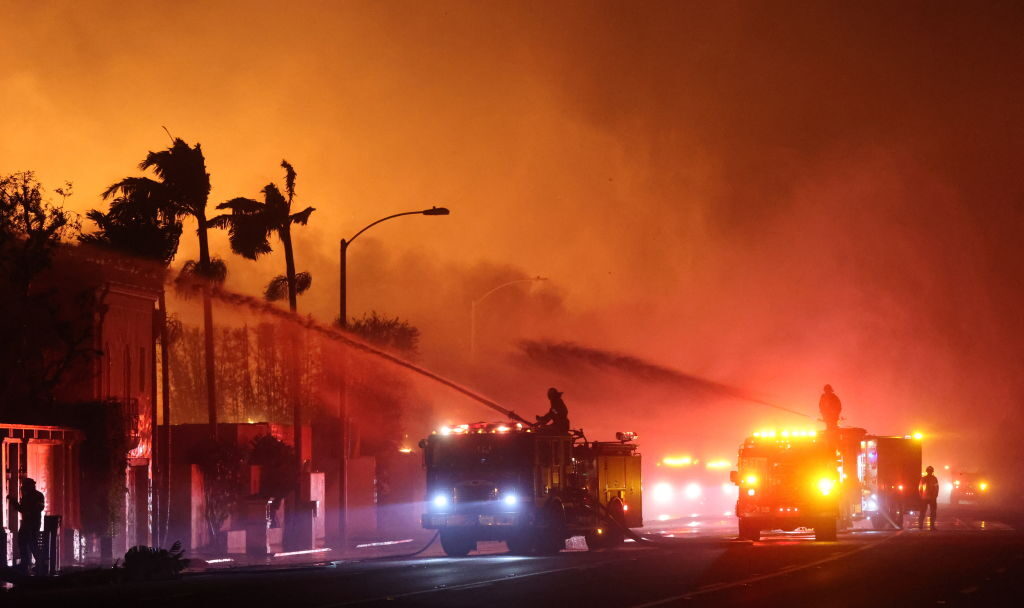The destruction wrought by the Southern California wildfires elicited mixed reactions from Iran, where Western cliches about a monolithic theocratic elite rarely survive scrutiny. The administration of President Masoud Pezeshkian, a relative moderate, offered assistance to the United States, while the U.S.-bashing hardliners, including senior clerics and conspiracy theorists, savored God’s wrath against a “godless” superpower in decline.
More striking than the divisions playing out in Tehran was the incongruity of sentiments in the “Little Iran” in Los Angeles, which hosts the largest community of Iranians outside Iran. There, the fires revealed divisions almost as stark as those back home.
Iranians of California have recreated piecemeal what they’ve been missing from their motherland: cuisine, music, garments, arts, and a sense of belonging. In L.A., they have built an insular world, dining in Persian restaurants and enrolling their children in Farsi-speaking schools. Still, however strong their association may appear to outsiders, the community can sometimes feel like a fragmented cluster of individuals from within.
For many, the regional blaze that erupted on January 7 brought personal hardship, while others, less affected, carried on with their daily routines. Internet figures welcomed a new round of social media fanfare. Some entertainers ignored the crisis, while others politicized it, to the chagrin of their detractors.
Influencers seized the moment. On smartphones, they filmed the evolving scenes, from car wheels being stolen to demolished houses being abandoned in real time. Churning out such footage, accompanied by sensational commentary, was their mission as “content creators.”
Other popular figures reacted with an apparent apathy that startled community members. These singers, dancers and TV hosts represent the early generation of entertainers who settled in Los Angeles after the 1979 revolution and established substantial fanbases. Weekly variety shows filmed in Hollywood studios continued to air as though there was no crisis to speak of, drawing criticism from X (Twitter) users who detected in the performers a lack of concern for their neighbors. The appearance of insensitivity is not a new phenomenon, and it arises from old pains.
If some California Persians look unruffled in this difficult moment, perhaps that is due to the trauma haunting them from their experiences in a repressive state. Many avoid consuming bad news—or any news for that matter—preferring the comforts of easy entertainment. They may have escaped tyranny and hardship, but that doesn’t mean they have no need for escapism.
Since the fires began, some Iranian-Americans have been accused of wrongdoing more serious than emotional detachment. Their fellow expats say they are politicizing the crisis on behalf of the Islamic Republic.
The charges are often unfair. Mojgan Shajarian, daughter of the legendary musician Mohammad Reza Shajarian, was singled out after she said on Instagram that the fires had forced her to postpone the scheduled release of a new song. “I thought we’d suffer from blackouts in Iran,” she said, “but it also happens here.” That statement was enough for edgy Iranian-Americans to accuse the singer of being an Islamic Republic “apologist.”
In another example, accusations of pro-Tehran apologia were not only unwarranted, but absurd. One Iranian dissident who has lived in Los Angeles since 1992, Shahram Homayoun, routinely berates the Iranian government on his political TV show. The Islamic Republic so despises Homayoun that in 2009, at the request of Tehran, Interpol issued a red notice for his arrest. Nevertheless, after he shared his reflections on the fires, he was labelled an acolyte of the clerical establishment.
In recent episodes of Homayoun’s program on the Persian-language Channel One TV, he expressed sympathy with the people of Gaza and Lebanon, recounting that the displacement he endured following the wildfires made him contemplate the suffering of these war-hit nations. In response, the diasporic keyboard warriors said that Homayoun was a fifth columnist of the Islamic Republic who supported Hamas and Hezbollah. In their view, a wanted rival of the regime was disguising himself as a dissident to covertly advance Tehran’s ideological mission.
In other cases, accusations of regime loyalty were more valid. Public figures affiliated with the Iranian government happened to be in the West Coast, or on their way, when the wildfires broke out. The narratives they shared mirrored the talking points of state media.
Jila Sadeghi, a presenter on Iranian state-funded television, recently disclosed that she has been a U.S. citizen for years. Sadeghi embodies an amalgam of religious conservatism and pluralistic virtue-signaling that many Iranian-Americans, as well as many Iranians at home, consider duplicitous. In an Instagram story from Tehran in which she shared footage of the raging embers, Sadeghi wrote, “the earth broke its silence, let’s not perpetrate oppression,” a reference to America’s role in prolonging the war in Gaza. In hundreds of comments, Iranian-Americans impugned her integrity, asking why she took an oath of allegiance for U.S. citizenship while reing on the Islamic Republic payroll.
The reaction to the California fires also showcased the effect of America’s partisan polarization on the community. While most Iranian-Americans lean Democratic, right-wing Persians consider Donald Trump a strongman who can uproot the “Tehran mullahs.” They agreed with his criticisms of the crisis management performance of the state’s Democratic Party, whose pro-immigration policies they’ve long resented. In their view, waves of immigration have brought too many “people of color” to the Golden State—evidently, they believe the term doesn’t apply to them.
In all the expressions of apathy, excitement, sorrow, and shock that sum up the response by the California Persians to the ongoing environmental calamity, a key feature of the Iranian-American diasporic culture is on full display: division.
Read the full article here

